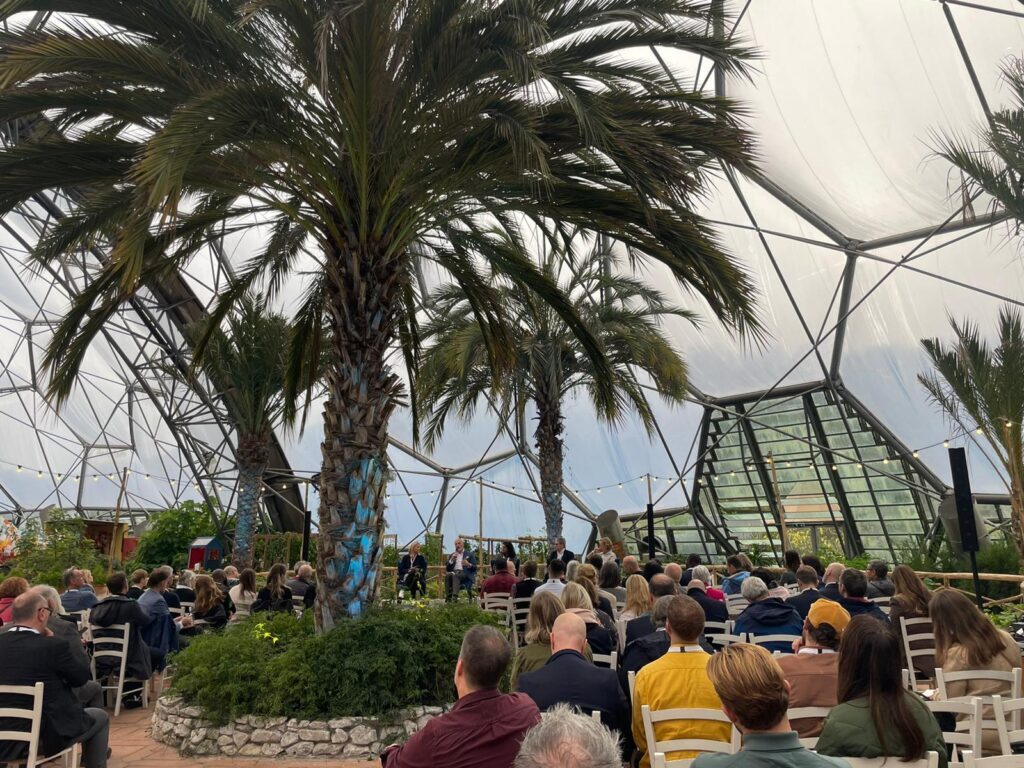
Words by Amy Packham
Anthropy is all about being optimistic, said John O’Brien, as he introduced the Future of Britain talk at the three-day event at the Eden Project.
“We’ve got to have hope,” he says, “because without that, we have no future.”
He was proposing a question to the panel and audience: what do we want Britain to look like in 30 years? Here’s a snapshot of what they said.
A transparent media
Kamal Ahmed, founder of The News Movement, focused on how we can reinvent journalism. “How do we reinvent it? People are not engaging with the present offers they are seeing – it’s not for them,” he said.
“I do feel optimistic. I want to see journalism resurrected for those audiences. If we don’t have trusted, non-partisan journalism which allows us to develop conversations about solutions as well as holding power to account, we lose a fundamental part of democracy.
“We need new offers alongside brilliant journalism that is about engagement, solutions, onward journeys – and that’s true for younger audiences.”

A sense of hope
Kelly Beaver MBE, from Ipsos Mori, said: "We understand how the British public think and feel."
When they asked the question what makes you proud to be British, it’s the NHS, the history, and our British institutions that came out on top. They’re proud of our contribution to scientific discovery, she says, including Covid and the climate crisis.
But, says Kelly, two in five people believe children will have worst lives than their parents have, and seven out of 10 of us believe our country is going in the wrong direction. “We need a sense of hopefulness about our place in the world,” she says.
“Leaders have a role in creating a sense of hope. There is a responsibility as a leader to create a sense of pathway to change.”
An investment in sport
Annamarie Phelps, from IWG on Women and Sport, says Team GB is the second most loved brand in the UK, to the NHS.
“Sport brings people together,” says Annamarie. “It raises a nation’s feelings and brings them together, but it also transforms lives and communities – as well as having the opportunity to change society if we use it in the right way.”
In the next 30 years, she says, we should invest and encourage more women and children to participate in sport. “Sport and physical activity will save the NHS,” she says.
“If, in 30 years, we have a community and a society that does stay active, it will reduce mental health issues, help reduce those suffering from heart disease, and more. If sport were a drug, it would be a miracle cure.”
But, she says, sport needs to transform and step up in the right direction – as well as achieving more gender quality – to become the fantastic tool it can be used for.
“There’s a lot of work sports needs to do but I believe we can get there. Sport is the future of this country and we will all benefit.”
A more equitable society
Bina Mehta has been at KPMG for over 30 years – in that time, she says, so much has changed.
“Looking forward, what I want for my kids, is a Britain that is thriving, not just surviving,” she says. “We need a Britain where people, business and communities can do well.
“We want to be part of a connected world, but living in a country where there is access to opportunity that is better balanced around the country and within communities.
“If we think about what divides us, I would like to see more commonality around us, rather than division.”